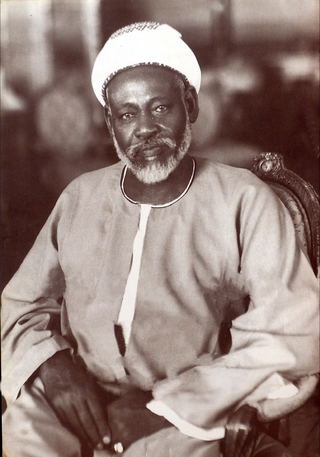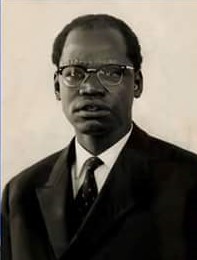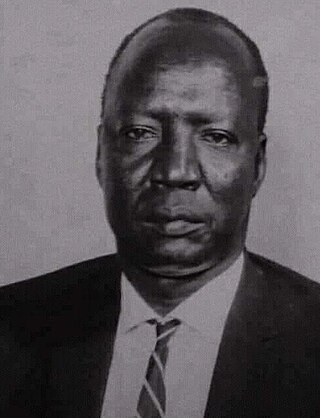Related Research Articles

Ismail al-Azhari was a Sudanese nationalist and political figure. He served as the first Prime Minister of Sudan between 1954 and 1956, and as Head of State of Sudan from 1965 until he was overthrown by Gaafar Nimeiry in 1969.

Ibrahim Abboud was a Sudanese military officer and political figure who served as the head of state of Sudan between 1958 and 1964 and as President of Sudan in 1964; however, he soon resigned, ending Sudan's first period of military rule. A career soldier, Abboud served in World War II in Egypt and Iraq. In 1949, Abboud became the deputy Commander in Chief of the Sudanese military. Upon independence, Abboud became the Commander in Chief of the Military of Sudan.

The Democratic Unionist Party, also referred to by itself as the Original Democratic Unionist Party, is a political party in Sudan, closely tied to the Khatmiyya Sufi order.

The Republic of the Sudan was established as an independent sovereign state upon the termination of the condominium of Anglo-Egyptian Sudan, over which sovereignty had been vested jointly in Egypt and the United Kingdom. On December 19, 1955, the Sudanese parliament, under Ismail al-Azhari's leadership, unanimously adopted a declaration of independence that became effective on January 1, 1956. During the early years of the Republic, despite political divisions, a parliamentary system was established with a five member Supreme Commission as head of state. In 1958, after a military coup, General Ibrahim Abboud was installed as president. The Republic was disestablished when a coup led by Colonel Gaafar Nimeiry founded the Democratic Republic of Sudan in 1969.
The Sudan African National Union is a political party formed in 1963 by Saturnino Ohure and William Deng Nhial in Uganda. In the late 1960s, the party contested elections in Sudan seeking autonomy for southern Sudan within a federal structure. The exile branch of the party meanwhile supported full independence. A party with this name was represented in the Southern Sudan legislature in 2008.
William Deng Nhial was the political leader of the Sudan African National Union (SANU), from 1962 to 1968. He was elected unopposed. He was one of founders of the military wing of the Anyanya fighting for the independence of southern Sudan. He was ambushed and killed by Sudanese Armed Forces (SAF) on 9 May 1968 at Cueibet, on his way from Rumbek to Tonj. The Sudanese government denied having authorised his assassination. Although no investigation was conducted, eyewitnesses at Cueibet village and an SANU investigation committee confirmed the SAF's part in his death.
The Liberal Party, at first called the Southern Party and later the Southern Liberal Party, was formed in Anglo-Egyptian Sudan before Sudan became independent in January 1956. Until the military coup of November 1958 the Liberals were one of the main parties representing the southern Sudanese constituencies in parliament.
Stanislaus Paysama was one of the founders of the Liberal Party in Anglo-Egyptian Sudan a few years before Sudan gained independence in 1956.
Ezboni Mondiri Gwanza was a politician in Southern Sudan. He was one of the founders of the Southern Sudan Federal Party (SSFP) in 1957, which competed in the Sudanese parliamentary election in 1958. Later he was active in secessionist movements.
Both Diu or Böth Diew was a politician who was one of the leaders of the Liberal Party in Sudan in the years before and after independence in 1956. His party represented the interests of the southerners. Although in favor of a federal system under which the south would have its own laws and administration, Both Diu was not in favor of southern secession. As positions hardened during the drawn-out First Sudanese Civil War (1955–1972) his compromise position was increasingly discredited.

Sir Sayyid Abdul Rahman al-Mahdi, KBE was a Sudanese politician and prominent religious leader. He was one of the leading religious and political figures during the colonial era in Anglo-Egyptian Sudan (1898–1955), and continued to exert great authority as leader of the Neo-Mahdists after Sudan became independent. The British tried to exploit his influence over the Sudanese people while at the same time profoundly distrusting his motives. Throughout most of the colonial era of Anglo-Egyptian Sudan, the British saw al-Mahdi as important as a moderate leader of the Mahdists.
Aggrey Jaden Ladu was a South Sudanese politician.
Abdallah Deng Nhial is a South Sudanese politician and scholar. He has served in both Sudanese and South Sudanese governments in different positions.

The 1969 Sudanese coup d'état was a successful coup, led by Colonel Gaafar Nimeiry, against the government of President Ismail al-Azhari. The coup signaled the end of Sudan's second democratic era, and saw the beginning of Nimeiry's 16 year rule.
Santino Deng Wol is a South Sudanese military figure serving as the chief of defence forces of the South Sudan People's Defence Forces. He served as Lion Division commander from 2007 to 2017 and currently serving as the Assistant Chief of Defence Force for Administration, Finance and Personnel of South Sudanese army, SSPDF after being transferred from the post of Ground Force Commander. His hometown is Udhum which is part of Aweil West County in Northern Bahr el Ghazal.
Siricio Iro Wani was a Sudanese official and statesman from South Sudan. He served as a member of the collective body at the helm of the Sudanese state, the First Sudanese Sovereignty Council, from 1955 to 1958.

Luigi Adwok Bong Gicomeho, also known as Luigi Adwok, was a South Sudanese politician who played a role in the political landscape of post-independence Sudan from the late 1950s into the 1980s. He was one of the first Southern Sudanese officials to serve as head of state of the Republic of Sudan as President of the Second Sudanese Sovereignty Council in March 1965.
Ahmed Mohammed Yassin was a Sudanese politician who was served as a member of the collective body at the helm of the Sudanese state, the First Sudanese Sovereignty Council, from 1955 to 1958.
Bona Malwal Madut Ring is a South Sudanese journalist, politician, and government official known for his advocacy for self-determination and secession for South Sudan. From the Dinka ethnic group, he pursued his education in journalism and economics in the United States, earning degrees from Indiana University and Columbia University. His career transitioned from an early stint as an Information Officer to journalism, including Editor-In-Chief positions at various Sudanese newspapers including the Southern Front's mouthpiece, The Vigilant.

Philemon Majok Kuong (1905–1982) was a South Sudanese politician who advocated for Sudan unity. Majok was born in Ador, Yirol, with a Nuer father and a Dinka Ciec mother. He achieved the rank of Staff Sergeant in the British Police Force during Anglo-Egyptian rule. During World War II, he fought for the British in Ethiopia. Majok's post-war contributions included urban planning and tree planting in Lakes State.
References
- ↑ Robert O. Collins; Professor of History Robert O Collins (29 May 2008). A History of Modern Sudan. Cambridge University Press. p. 83. ISBN 978-0-521-85820-5.
- 1 2 3 4 5 6 7 The Diplomatic Press Sudan Trade Directory: Including Classified Trade Index. Diplomatic Press and Publishing Company. 1963. p. 145.
- 1 2 Tim Niblock (1 August 1987). Class and Power in Sudan: The Dynamics of Sudanese Politics, 1898–1985. SUNY Press. p. 74. ISBN 978-0-88706-481-4.
- ↑ Elwyn James Blattner (1955). Who's who in U.A.R and the Near East. Paul Barbey Press. p. 102.
- ↑ M. W. Daly (11 December 2003). Imperial Sudan: The Anglo-Egyptian Condominium 1934–1956. Cambridge University Press. p. 384. ISBN 978-0-521-53116-0.
- ↑ Africa Special Report: Bulletin of the Institute of African American Relations. The Institute. 1959. p. 17.
- ↑ S. Steinberg (27 December 2016). The Statesman's Year-Book 1963: The One-Volume ENCYCLOPAEDIA of all nations. Springer. p. 1437. ISBN 978-0-230-27092-3.
- ↑ Commonwealth Survey. Central Office of Information. 1958. p. 1063.
- 1 2 3 Mansour Khalid (12 October 2012). War & Peace In The Sudan. Routledge. p. 92. ISBN 978-1-136-17917-4.
- 1 2 3 H̤̊asan Makkī Muh̤̊ammad Ah̤̊mad (1989). Sudan, the Christian design: a study of the missionary factor in Sudan's cultural and political integration, 1843–1986. Islamic Foundation. p. 125. ISBN 978-0-86037-193-9.
- ↑ Dunstan M. Wai (1 March 1981). The African-Arab Conflict in the Sudan. Africana Publishing Company. p. 114. ISBN 978-0-8419-0631-0.
- ↑ Kuyok Abol Kuyok (4 September 2015). South Sudan: The Notable Firsts. Author House. pp. 249–250. ISBN 978-1-5049-4346-8.